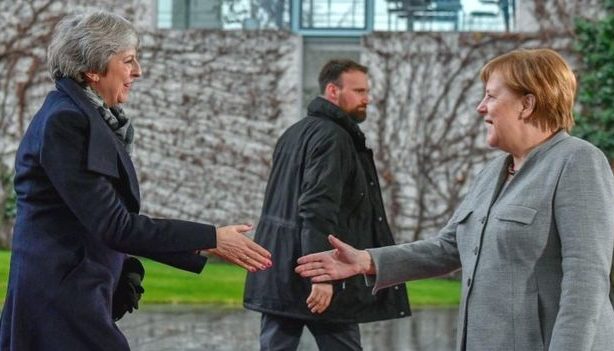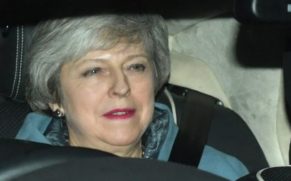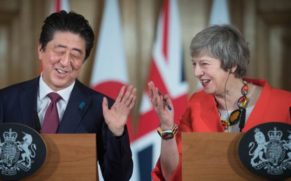She has held talks with Dutch PM Mark Rutte and Germany’s Angela Merkel after postponing a Commons vote on the deal.
The UK PM has said she needs “further assurances” about the Northern Ireland border plan to get backing from MPs.
European Commission President Jean-Claude Juncker said the EU would not “renegotiate” the deal but there was room for “further clarifications”.
Labour leader Jeremy Corbyn labelled Mrs May the “runaway prime minister” and said the trip was a “waste of time and public money”.
The prime minister is understood to be seeking legal guarantees that the UK will not be trapped in the Northern Ireland backstop plan indefinitely.
Critics object to the backstop – a temporary customs arrangement designed to prevent the need for checkpoints at the Irish border if a long-term solution that avoids them cannot be agreed – because it imposes different regulations in Northern Ireland from the rest of the UK.
They also object to the fact that under the terms of the withdrawal agreement, the UK can not exit the backstop without the EU agreeing.
What is Theresa May asking for?
Commons leader Andrea Leadsom said Mrs May was seeking to give the UK Parliament a vote on whether to enter the backstop – and an annual vote on whether the country should remain in it.
She told BBC Radio 4’s Today programme this could be done in an “addendum” to the withdrawal agreement, without changing the main text of it.
Asked if this would be enough to satisfy critics of her deal, she said Mrs May was “absolutely determined to get a deal Parliament can vote for”.
In other Brexit developments
- Commons leader Andrea Leadsom questioned Speaker John Bercow’s impartiality on Brexit
- A Labour backbencher was expelled from the Commons after grabbing the ceremonial mace in protest. As the symbol of royal authority in Parliament, the mace is required for the House to meet and pass laws; it has been seized several times by protesting MPs over the years
- Former Prime Minister David Cameron insisted he had no regrets about calling the referendum, saying he had “made a promise” to do so
- The Brexit secretary said policy “had not changed” despite a European court ruling the UK could cancel Brexit without permission from the other 27 EU members
What next for the vote on deal?
MPs have to give the go-ahead for Mrs May’s deal if it is to come into effect when the UK leaves the EU on 29 March.
Downing Street has said a Commons vote will be held on the deal before 21 January and Brexit minister Robin Walker told MPs he hoped it “would be sooner than that”.
Mrs Leadsom earlier suggested talks with the EU could go right down to the wire, saying: “The EU is always in a position where it negotiates at the last possible moment.”
Jean-Claude Juncker, who is holding talks with Mrs May in Brussels, said: “The deal that we have achieved is the best deal possible, it is the only deal possible.”
But he said there was “room enough to give further clarifications and further interpretations”.
It is not clear if that would be enough to win over Conservative Brexiteers and the Democratic Unionist Party, whose votes Mrs May relies on to win key votes in the Commons, who have called for the entire backstop plan to be dropped.
May faces backlash from MPs
The prime minister’s U-turn sparked anger among MPs on all sides, who had spent three days debating the deal and had been promised the final say on it on Tuesday.
Buzzfeed claimed Mrs May had informed some EU leaders about her plan to abandon the vote on Sunday – well before she told the cabinet.
Speaking during an emergency debate in the Commons on the government’s handling of Brexit, Mr Corbyn said such reports were “disturbing” – and he urged Mrs May to “admit her deal is dead”.
“What is she doing in Europe? This runaway prime minister is not even seeking to negotiate. She confirmed she is only seeking reassurances. Our prime minister is traipsing round the continent in pursuit of warm words.”
More backbench Tory MPs are considering submitting letters of no confidence in Theresa May in the hope of toppling her and forcing a Tory leadership contest. If she was no longer Conservative Party leader she would also be expected to step down as prime minister.










